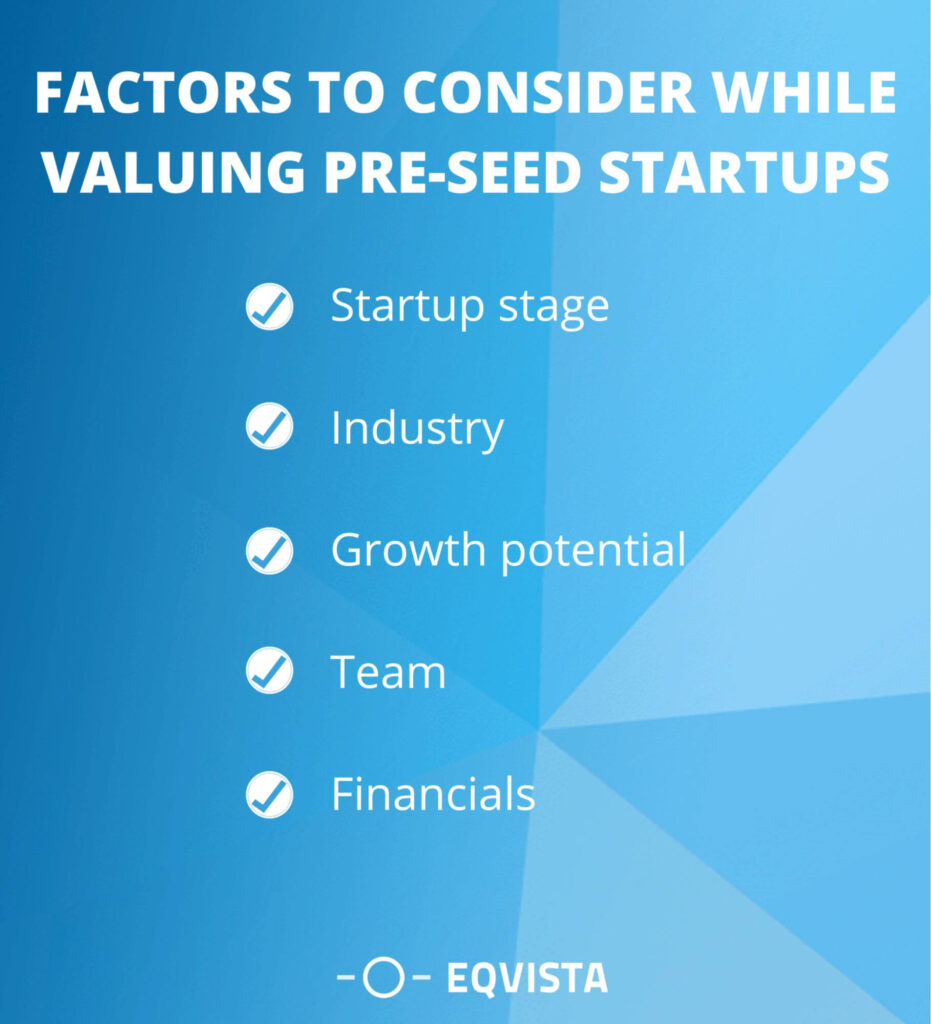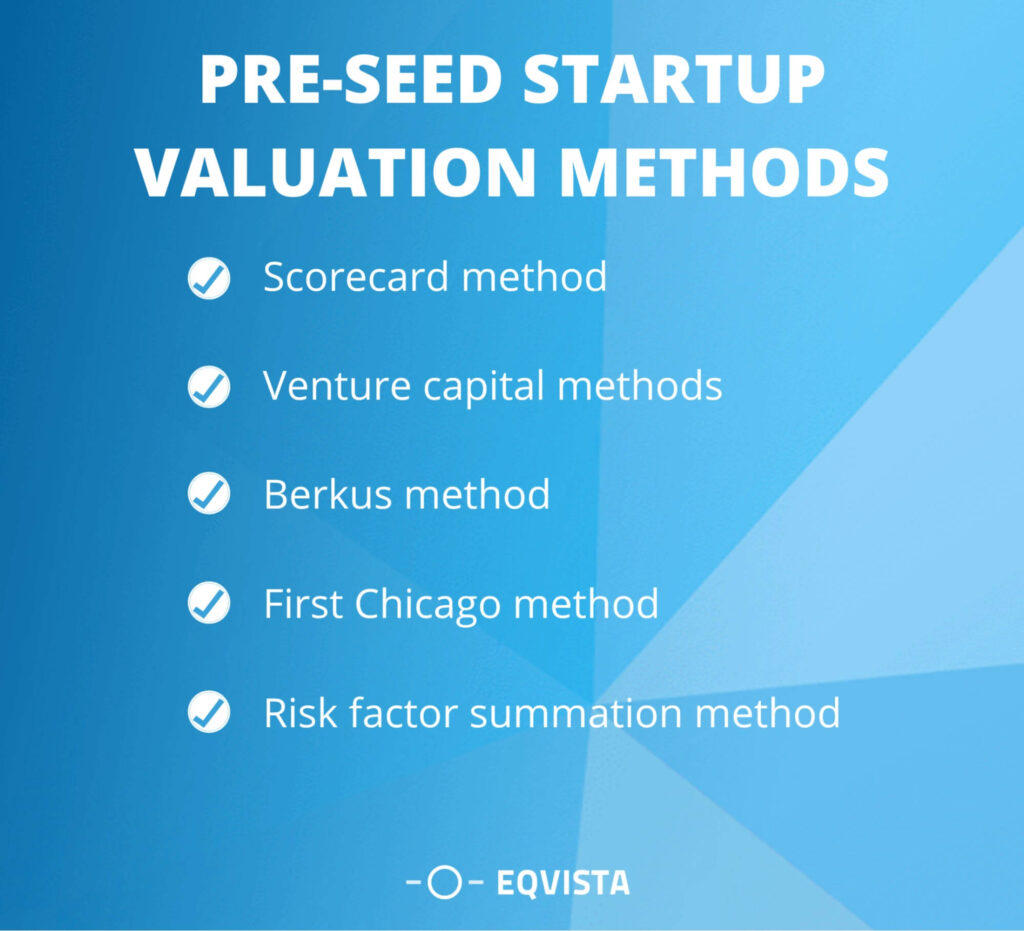How to Value Pre-Seed Startups?
With the recent funding trends, pre-seed startups are gaining attention. Pre-seed startups are new businesses in the very early stages of development and looking to raise capital. Valuing pre-seed startups refers to the process of determining the economic worth of a startup. Now, you might wonder how to value a pre-seed startup, why we should value a pre-seed startup, and what factors to consider while valuing a pre-seed startup.
In this article, we will take an in-depth overview of pre-seed startups, how to value pre-seed startups and other related concepts you need to understand.

Pre-seed startups valuation
To better understand pre-seed startup valuation, let us take a general look at pre-seed startups and their valuation.
The term pre-seed refers to the earliest round of funding a startup receives. The amount of funding varies, and it usually ranges from $100,000 to $1,000,000. Pre-seed startups are barely off the ground, and they have no revenue. However, these startups have an idea and product in development and they are looking for investors to support their growth.
Example for pre-seed startup Valuation
Let’s consider the example of a pre-seed startup developing a new type of artificial intelligence (AI) chip. The startup has a strong management team with experience in the AI industry, targeting a large and growing market.
The median pre-money valuation for AI startups is $12 million, but the startup believes its unique and innovative product merits a higher valuation.
Valuation: To value the startup, we can use the following approach:
- Median pre-money valuation for AI startups: $12 million
- Adjustment for unique and innovative products: +20%
- Adjustment for strong management team: +10%
Final valuation: $12 million * (1 + 0.20 + 0.10) = $16.8 million
Conclusion: The pre-seed valuation of the AI startup is $16.8 million. This valuation is based on the median pre-money valuation for AI startups, the startup’s unique and innovative product, and the strength of the startup’s management team.
While valuing pre-seed startups requires a lot of research, estimation, analysis, and calculations. As a result, there are various startup valuation methods that can be used. Since the valuation of pre-seed startups is based on several factors, using proven methods can help you achieve an accurate value of a pre-seed startup.
The following section of the article will briefly discuss the concept of pre-seed startups and their valuation.
What are Pre-seed startups?
Pre-seed startups are new business ventures in the concept or prototype development stage. During this startup stage, the business will begin to develop its product, build a prototype, recruit a team, execute the business plan, and likewise seek funding.
Pre-seed startups typically do not have any revenue and are valued primarily based on projections of the company’s future.
Pre-seed funding refers to the initial capital that is raised by startups even before seed funding and other stages. As a result, the success of these startups is dependent on their long-term potential and business plans, which can be improved through additional rounds of funding..
How does pre-seed startup work?
Well, the essence of pre-seed startups lies in the fact that they are in the early stages of development. Pre-seed startups are usually innovative and test their business ideas by executing the steps in the business plan. As a result, any startup ready to raise the initial capital for its growth will be considered a pre-seed startup.
These startups work in the same manner as any other small business, from the recruiting of employees to the execution of the business plan. Innovation, Creativity, and the Execution of a business plan is the working model for pre-seed startups.
What is pre-seed startup valuation?
When it comes to pre-seed startup valuation, they are usually valued on the basis of future growth potential, current and future market trends, the perceived risk of failure in a startup, and other related factors. While the process of valuation of pre-seed startups is quite complex and comprises several steps, it is essential to have a solid understanding of the valuation process.
Several startup valuation methods can be used to arrive at a precise value for pre-seed startups. It is a mix of qualitative and quantitative factors that are used to determine the worth of a startup.
Benefits of valuing a pre-seed startup
As valuation plays a pivotal role in the startup lifecycle, it is essential to understand the benefits associated with this. Here are a few benefits of pre-seed startup valuation:
- Funding Foundation: Pre-seed startups that require funding need to know the value of the company. Investors usually use valuation reports to figure out how much an investment is worth. Also, valuation helps figure out the return on investment (ROI).
- Risk assessment: Pre-seed startups have a higher chance of failing because they are just starting out. Valuation helps entrepreneurs figure out how likely it is that their business will fail, so they can take the necessary precautions.
- Growth Gauge: Startups can use pre-seed valuations as a way to measure their growth. This information helps startups make strategic decisions that will improve their performance.
- Attracting Investors: An accurate valuation gives investors more confidence and brings in possible backers.
- Equity Distribution: Valuations help figure out how founders, team members, and future stakeholders will get their shares of the company.
- Strategic Decision-Making: Valuation insights help guide important business decisions about direction, growth, and how to use resources.
- Benchmark for Progress: Regular valuations give a way to track how a startup is growing and where it stands in the market.
Factors to consider while valuing pre-seed startups
When it comes to pre-seed startup valuation, various factors need to be considered. The following list includes some of the common factors that need to be considered when valuing a pre-seed startup:

- Startup stage – The first and most important factor to consider while valuing a pre-seed startup is its operating stage. Based on the current phase of the startup, different inputs and approaches can be used to value a pre-seed startup.
- Industry – It is essential to consider the industry in which a pre-seed startup operates. Specific factors such as market segment, competition, and trends related to the industry can influence the value of a pre-seed startup.
- Growth potential – Growth potential is essential to consider the future prospects, revenue streams of a startup, and its ability to reach the projected potential to arrive at an accurate valuation.
- Team – The team’s expertise, experiences and past performance are factors that influence the value of a pre-seed startup due to the fact that the team plays a significant role in the performance of a startup.
- Financials – The financial aspects of a pre-seed startup also need to be considered while valuing a startup. This can help provide a better understanding of the financial position of the company.
Pre-seed startup valuation components you should consider
The valuation of pre-seed startups is an important process that requires a thorough analysis of various factors. Here’s a list of some of the pre-seed startup valuation process components you should consider before arriving at an accurate valuation for a pre-seed startup:
- Business and management team – A pre-seed startup needs to be backed by a strong and experienced team. In this regard, the founding team, the board of directors, and the overall team’s strength should be considered while evaluating. As a result, it is important to conduct a detailed analysis of the business and management team during the startup valuation process.
- Goal of the business – It is essential to evaluate the goals of the business, along with the financial, and management plans, operational strategies, and other related factors that help determine the worth of a pre-seed startup.
- Managing for founder dilution – At the initial stages, equity dilution must be carefully managed. The amount of equity being distributed to the investors, advisors, and other stakeholders should be closely monitored to avoid over-dilution. Therefore, during the valuation process, the potential impact of equity dilution on founders should be considered.
How to do pre-seed startup valuation?
Now that you know what pre-seed startup valuation means and the factors that need to be considered while valuing a pre-seed startup, it is time to understand the process of performing it. Well, there are several startup valuation approaches and methods used to value a pre-seed startup. Depending on the inputs and factors considered, an appropriate method can be used to determine the worth of a startup.
Pre-seed startup valuation methods
The following list describes some of the common methods that can be used to value a pre-seed startup:

- Scorecard method – The scorecard method is a simple valuation approach and assumes that it estimates a pre-seed startup’s valuation by evaluating a few key parameters.
- Venture capital methods – The venture capital method is a more complex approach to valuation and involves the use of a financial model. While this method is generally used by professional investors. This method estimates a startup’s exit or terminal value when it reaches maturity.
- Berkus method – The Berkus method is another valuation approach used to determine the worth of a pre-seed startup. Dave Berkus developed this model, which draws its inspiration from five aspects that affect a startup’s value.
- First Chicago method – A startup is valued using this method based on three projections: success, failure, and survival. These different scenarios are averaged using weighted numbers to determine a final valuation. To make an appropriate assessment, one must have a thorough grasp of the startup in question. This method is considered an effective model for valuing pre-seed startups.
- Risk factor summation method – As the name suggests, this model is considered a risk-assessment approach and is effectively used to evaluate a pre-seed startup. Similar to the scorecard method, this technique depends on estimates and judgments but only considers twelve risk factors.
How do I find the right pre-seed investor for my startup?
Startups must find compatible pre-seed funding investors, similar to finding a partner. Prioritizing a good working relationship is crucial. Here are some tips to consider.:
- Experience –Investors often provide financial support to startups. Those with relevant entrepreneurial experience are especially valuable. Founders should evaluate potential investors carefully. Partnerships with the right investor can bring long-term benefits and new fundraising opportunities for the startup.
- Commitment – Investing in a startup requires commitment and faith in the founders, especially during difficult times. Discord between founders and investors, as well as external issues, can be catastrophic.
- Involvement –Investors can mentor but shouldn’t interfere with the founder’s vision. Entrepreneurs should clarify this before accepting funds, especially from personal contacts. Misunderstandings about the investor’s role are common since pre-seed investors may not fully understand their involvement.
- Equity share – Startups must exchange equity for funding, leading to dilution with every funding round. Pre-seed funding typically requires an equity share of 10%. Founders must educate investors on equity and avoid succumbing to high demands based only on personal relationships.
Create your company’s pre-seed cap table on Eqvista!
Pre-seed startup valuation requires significant knowledge and expertise. Thus, the process of valuation can become complex and tricky. However, you can still determine the value of your startup.
With the help of professionals and experts like Eqvista, you can get your pre-seed startup valued easily. At Eqvista, we have the expertise, skills, and knowledge to help you with your pre-seed startup valuation. For additional information, get in touch with our team today!
